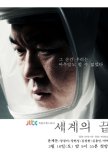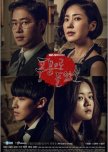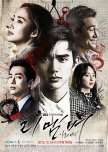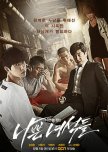
The End of the World
7 personnes ont trouvé cette critique utile
The way in wich it mixes the police thriller and the medical drama is quite new and refreshing, especially for the Korean television, where it is so rare to see something that tries to break off from the conventional genres. What is particularly praiseworthy in this drama is the strict commitment to realism in the portrayal of characters and scenes to counterbalance the science-fiction elements of the plot. You end up believing the whole story, although it can seem unrealistic, because you see the people on the screen behave like you imagine they could do in the real world.
I feel here that the director and the writers really believe that the story they are telling is worth of attention, and so the plot is not simply the pretext for the typical scenes you could expect in this kind of drama, but is well assembled so that each step leads to the next in a natural way.
The medical and political elements of the setting are well explored and instead of being merely on the background they constitute one of the driving elements of the plot.
For once you have doctors that do not act like every 16 years old schoolgirl, but you can feel that there is something specific in their professionalism.
Another thing that makes this drama really stand apart is that it tries to convey some meaning, not just to fill up the airing time it is given. It displays a society in wich the egoism of each individual leads to a possible disaster, and explores various forms in wich this egoism hide itself.
I have to admit that the show slows a bit down in the middle part and that the ending, with the cut imposed by jtbc, although decent, is not as satisfying as it could have been.
Finally The End of the World is another great work from director An Pan Seok and a great show for people that want something more than the typical drama.
Cet avis était-il utile?

Heard it Through the Grapevine
6 personnes ont trouvé cette critique utile
Once I started watching her dramas I found it very difficult to go back to the ones I used to watch.
Everything looks so precise, so well thought, so realistic that you end up questioning yourself on how you were able to accept all that clumsiness that is the main ingedient of the average korean drama.
Heard it trough the grapevine is an amazing show that deconstructs the elements at the base of the typical rich marry the poor tale in order to question its moral assumptions.
From the start, the stereotype is reversed. Instead of an inexplicable and adamant purely platonic attraction we are confronted with the complex emotivity of two teenagers that cannot distinguish so clearly between the spiritual and the physical.
The progression of the story is not that through her unjustified pride the heroine, after having met every possible calamity to atone the sin of her poverty, finally enters the word of the riches. It's exactly the opposite.
Even the usual family revenge subplot is treated in a much mature way, without incredibly tragic past events providing material for lenghty heart-rending flashbacks.
I particularly like how the corrupted environment of the upper class, an essential ingredients of this kind of play, is not portrayed in the usual exaggerated manichean way. Instead of being pure evil ready to committ all sorts of crimes the characters walk the ambiguous line between a simple moral misconduct and the crime of corruption. Because in the end we do not expect lawyers to act like gangsters, even when they are shady they would somehow try to manipulate the law instead of openly breaking it. Moreover for once is not that everyone is willing to compromise is moral integrity for money ( As dramas have accustomed us to think), but people are moved by complex and intertwined motivations that can make a corrupted person redeem or vice versa.
In this respect I noticed that usually people appreciate how moral seem dramas or movies in opposing the poor good characters to the evil rich, seeing in this a portrayal of our society.
But firstly I do not think that the good and the evil usually present themselves with such clear distinction, secondly i dislike how the average drama end up teaching us that there is no use opposing the rich ad the powerful because their corruption is so deeply rooted that only ficitve characters with superpowers can oppose them. In Heard it Through the Grapevine, instead, we find a world ( as the one we live in, I suppose) where if you are not to greedy you can choose to be honest, that it is not so worse than being a corrupt rich, and people usually prefer to live honestly so that they can quietly sleep at night. In this respect I find exemplary how the people working for the Han family progressively end up questioning their authority and decide to leave them.
There would be much more to say about this drama, as for instance how it portrays the ambivalent power of education and knowledge to both free and bind people, but I think I'll end this review here.
Just to finish, I have to say that I find the narrative of this drama very compelling, I thought that every character and every subplot were amazingly interesting and in the end I really enjoyed watching it.
Cet avis était-il utile?

There is not a single moment where you could believe what is happening might be realistic, as the drama continuously resorts to all the possible cliches to develop both the characters ( the perfect and pure poor family, the evil Ceo, the righteous but naive heroine, ...) and the plot ( typical blackmailings, betrayals, last minute confessions, sudden repentances). All with the usual liter of tears.
There is no need to say that the court setting is not treated as a specific field worth of investigation and capable of generating interest per se ( as should be in any good drama or movie dealing with a specific professional environment), but rests as the background for a revenge story that would have worked the same way in any other context.
What you get in the end is a collection of stereotipical scenes drawn up only to have an emotional impact on the viewer based on very simple patterns, without any ambition to induce an intelluctual reflection.
You could argue that this is what most dramas do, and in this respect Remember is not worse than many.
The music is the icing on the cake of the aforementioned scenes, overly dramatic, repetitive and annoying.
The only bright note is Nam Gung Min acting, wich I find quite compelling in his portrayal of the evil antagonist, similar to what has done Yoo Ah In in the movie Veteran.
The general quality of the production is on par with what you can see on 2015 Korean television, so in the end if you are not particularly picky you can whatch this show without particular problems, but not if you are fed up with the ordinary and you are looking for something more.
Cet avis était-il utile?

Since I feel that most dramas are made for women, it stands indeed somehow apart from the majority.
That's how I can explain the enthusiastic reviews it gets.
But that doesn't mean that it is really something different, that would be for me something good or interesting. It still relays on a convoluted plot that does only a slight amount of sense, being only a pretext for a collection of cool scenes. Each character could be nice taken alone, but is clear that they are together only because so says the script. Also, as usual, there are liters of tears running down, plenty of emotional flashbacks, countless tragedies befalling the main characters and so on.
That's what i find annoying about this drama: you are constantly left with the impression that what you're seeing was only thought to look good and to lure your emotions in a cheap way, without paying a minimum of attention to the internal coherence of the story.
In the end is still somehow enjoyable, I liked the acting and Jo Dong Hyuk, but is not something above average.
Cet avis était-il utile?



